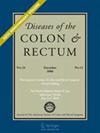局部应用间充质干细胞衍生的外泌体治疗克罗恩病患者的难治性肛周瘘:II期临床试验。
IF 3.2
2区 医学
Q2 GASTROENTEROLOGY & HEPATOLOGY
引用次数: 0
摘要
背景克罗恩病肛周瘘通常对标准的抗肿瘤坏死因子-α疗法产生抗药性。间充质干细胞(MSC)衍生的外泌体是一种细胞外囊泡,具有很强的抗炎作用,本研究的前一阶段证明了它们在治疗难治性肛周瘘中的安全性。目的评估间充质干细胞衍生外泌体治疗难治性肛周瘘的疗效。设计非随机、非盲法单中心II期临床试验。难治性肛周瘘的定义是至少一个疗程的抗肿瘤坏死因子-α治疗无效。在最后一次注射后的 6 个月内,每月对患者进行随访。每次注射前从瘘道中获取组织样本,并进行免疫组织病理学评估。主要结果测量本研究的主要结果是临床检查和磁共振成像显示的瘘道闭合情况。结果12 名患者(60%)的瘘道完全闭合。4名患者的临床症状有所改善,但部分瘘管仍未闭合,4名患者对治疗完全耐药。试验期间共治疗了 43 个瘘道,其中 30 个(69.7%)完全闭合。组织病理学分析显示,局部炎症明显减轻,组织再生迹象增强。分化簇-68、20和31的免疫组化分析再次证实了这些结果。结论MSC衍生外泌体对于治疗克罗恩病患者的难治性肛周瘘是安全有效的。参见视频摘要。本文章由计算机程序翻译,如有差异,请以英文原文为准。
Localized Administration of Mesenchymal Stem Cell-Derived Exosomes for the Treatment of Refractory Perianal Fistula in Crohn's Disease Patients: A Phase II Clinical Trial.
BACKGROUND
Crohn's disease perianal fistulae are often resistant to standard anti-TNF-α therapies. Mesenchymal stem cell (MSC)-derived exosomes are extracellular vesicles that have highly potent anti-inflammatory effects, and the previous phase of this study demonstrated their safety in the treatment of refractory perianal fistulas.
OBJECTIVE
To evaluate the efficacy of mesenchymal stem cell-derived exosomes for the treatment of refractory perianal fistulas.
DESIGN
Nonrandomized, nonblinded single-center phase II clinical trial.
SETTINGS
Tertiary university hospital.
PATIENTS
Twenty-three patients were enrolled, 20 of whom completed the study. Refractory perianal fistula was defined as resistance to at least one course of treatment with anti-tumor necrosis facto-α therapy.
INTERVENTIONS
After clinical assessment and magnetic resonance imaging, the patients were subjected to general anesthesia, and 5 mL of exosome solution was injected directly into the fistula tracts. The injections were repeated three times at 2-month intervals, and patients were followed monthly for 6 months after the last injection. Tissue samples from the tracts were obtained before each injection and subjected to immunohistopathological assessment. MRI data were obtained before and six months after the last injection.
MAIN OUTCOME MEASURES
The primary outcome of this study was fistula tract closure on clinical examination and magnetic resonance imaging. The secondary outcome was an improvement in the discharge from the tracts.
RESULTS
Fistula tracts were fully closed in 12 (60%) of the patients. Four patients showed clinical improvement, with some tracts remaining open, and four patients were completely resistant to treatment. A total of 43 fistula tracts were treated during the trial, 30 (69.7%) of which showed complete closure. Histopathological analysis revealed substantial reductions in local inflammation and signs of enhanced tissue regeneration. Immunohistochemical analysis of cluster of differentiation-68, 20 and 31 reaffirmed these results.
CONCLUSIONS
MSC-derived exosomes are safe and effective for treating refractory perianal fistulas in patients with Crohn's disease. See Video Abstract.
求助全文
通过发布文献求助,成功后即可免费获取论文全文。
去求助
来源期刊
CiteScore
4.50
自引率
7.70%
发文量
572
审稿时长
3-8 weeks
期刊介绍:
Diseases of the Colon & Rectum (DCR) is the official journal of the American Society of Colon and Rectal Surgeons (ASCRS) dedicated to advancing the knowledge of intestinal disorders by providing a forum for communication amongst their members. The journal features timely editorials, original contributions and technical notes.

 求助内容:
求助内容: 应助结果提醒方式:
应助结果提醒方式:


